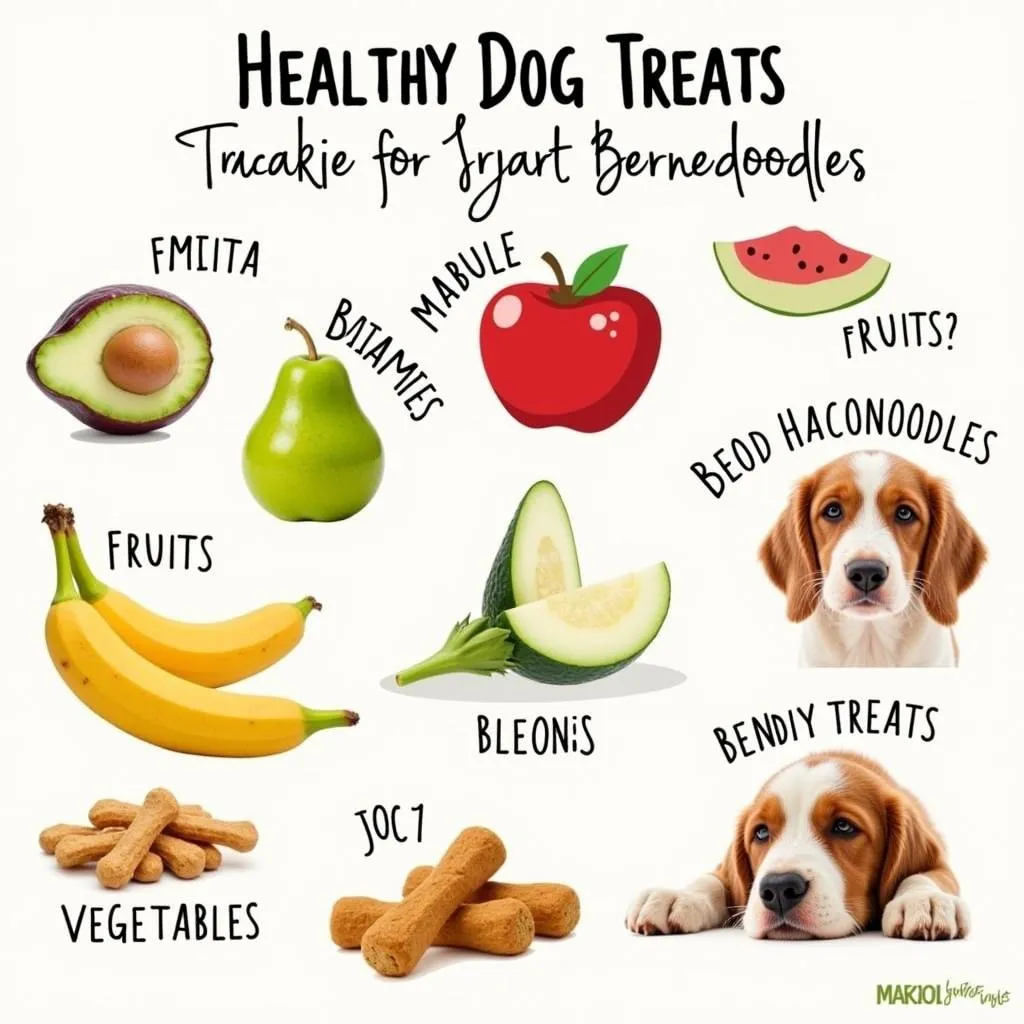Choosing the right food for your Bernedoodle is one of the most important decisions you’ll make as a pet parent. These adorable and energetic dogs require a balanced and nutritious diet to support their growth, development, and overall well-being. This comprehensive guide will delve into the specifics of Bernedoodle Food, covering everything from nutritional needs to feeding schedules, and addressing common questions to help you make informed choices for your beloved companion.
 Bernedoodle puppy eating from a bowl
Bernedoodle puppy eating from a bowl
Understanding Your Bernedoodle’s Nutritional Needs
Bernedoodles, a crossbreed between Bernese Mountain Dogs and Poodles, inherit characteristics from both parent breeds, influencing their dietary requirements. They are typically classified as medium to large breed dogs, with adults weighing between 40 to 90 pounds. Their energy levels can range from moderate to high, depending on their size and individual personality.
To keep your Bernedoodle thriving, their food should consist of:
- High-Quality Protein: This is crucial for muscle growth and repair. Look for food with real meat or fish as the first ingredient.
- Healthy Fats: Essential fatty acids contribute to a shiny coat, healthy skin, and overall well-being.
- Carbohydrates: Provide energy for their daily activities. Opt for complex carbohydrates like brown rice and oats over simple carbs.
- Vitamins and Minerals: These micronutrients support various bodily functions, from immune health to bone strength.
Life Stages and Dietary Considerations
A Bernedoodle’s dietary needs evolve with age. Here’s a general guideline:
- Puppies (Up to 1 year): Growing Bernedoodles need a higher calorie intake and a specific nutrient profile to support their rapid development. Choose a high-quality puppy food formulated for large breeds to prevent skeletal problems.
- Adults (1-7 years): Once they reach adulthood, you can transition them to adult dog food. Monitor their weight and adjust portions based on their activity levels.
- Seniors (7+ years): Senior Bernedoodles may have different dietary requirements due to age-related health conditions. Consult your vet about switching to a senior dog food formula that caters to their changing needs.
Choosing the Right Bernedoodle Food: Factors to Consider
With numerous dog food brands and formulations available, selecting the best one for your Bernedoodle can feel overwhelming. Consider these factors:
- Breed Size: Opt for food specifically designed for medium to large breed dogs.
- Activity Level: Adjust the calorie intake based on your dog’s daily activity routine.
- Age: Choose puppy, adult, or senior food according to your Bernedoodle’s life stage.
- Ingredients: Look for high-quality protein sources, healthy fats, and avoid artificial additives, fillers, and by-products.
- Allergies and Sensitivities: If your Bernedoodle has known food allergies, choose hypoallergenic or limited ingredient diets.
- Budget: While premium brands often offer superior quality, explore options that fit your budget without compromising on essential nutrients.
Feeding Schedule and Portion Control
Establishing a consistent feeding routine is vital for your Bernedoodle’s digestion and overall well-being.
- Puppies: Feed them 3-4 small meals per day to avoid digestive upset and maintain stable blood sugar levels.
- Adults: Most adult Bernedoodles thrive on 1-2 meals per day.
Use the feeding guide on your chosen dog food as a starting point and adjust the portion size based on your dog’s weight, activity level, and body condition. Remember, every dog is unique, so what works for one Bernedoodle might not work for another.
Common Questions About Bernedoodle Food
Q: Can Bernedoodles eat grain-free food?
A: While grain-free diets are popular, there’s no conclusive evidence suggesting they’re necessary for all Bernedoodles. In some cases, grain-free diets have been linked to heart problems in dogs. Consult your veterinarian before switching to a grain-free diet to ensure it aligns with your dog’s specific health needs.
Q: What are some healthy treats for Bernedoodles?
A: Opt for low-calorie, nutritious treats like small pieces of fruits (apples, bananas, blueberries), vegetables (carrots, green beans), or commercially prepared dog treats made with natural ingredients.
 Assortment of healthy treats for Bernedoodles
Assortment of healthy treats for Bernedoodles
Q: How can I transition my Bernedoodle to a new food?
A: Abrupt food changes can lead to digestive upset. Gradually transition your dog to a new food over 7-10 days by mixing increasing amounts of the new food with their current food until they’re fully transitioned.
Conclusion
Providing your Bernedoodle with a balanced and nutritious diet is paramount to their health and happiness. By understanding their specific needs, considering their life stage and activity level, and choosing high-quality food, you can ensure they live a long, active, and fulfilling life by your side. Remember to consult your veterinarian for personalized dietary advice tailored to your furry friend’s individual needs.
If you need any assistance in choosing the right food for your Bernedoodle, please contact us at Phone Number: 02437655121, Email: [email protected] or visit us at 3PGH+8R9, ĐT70A, thôn Trung, Bắc Từ Liêm, Hà Nội, Việt Nam. We have a 24/7 customer support team ready to assist you.